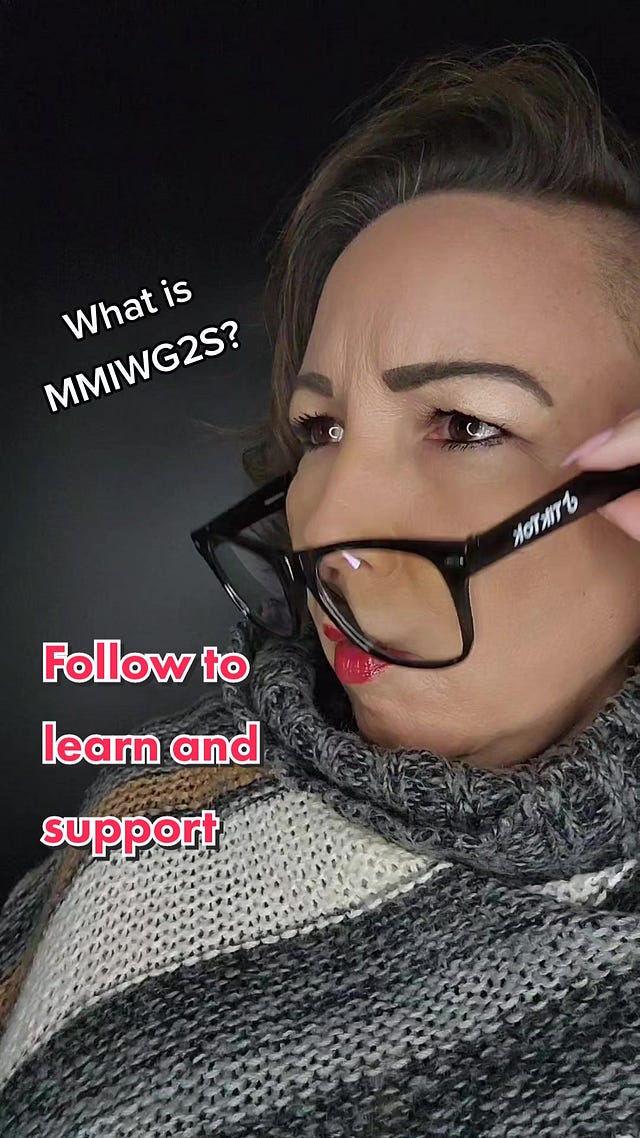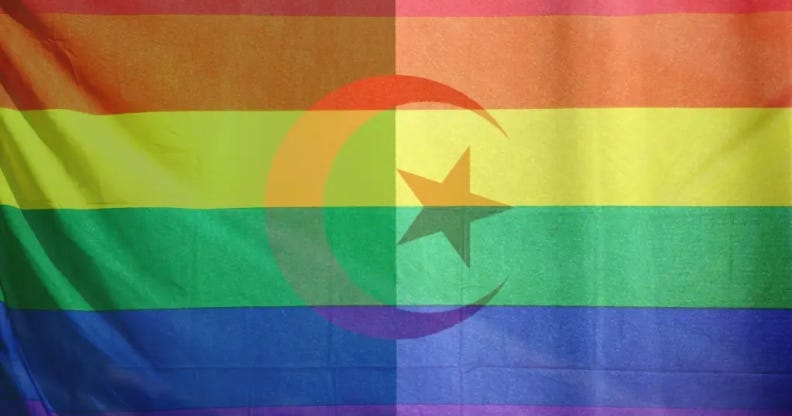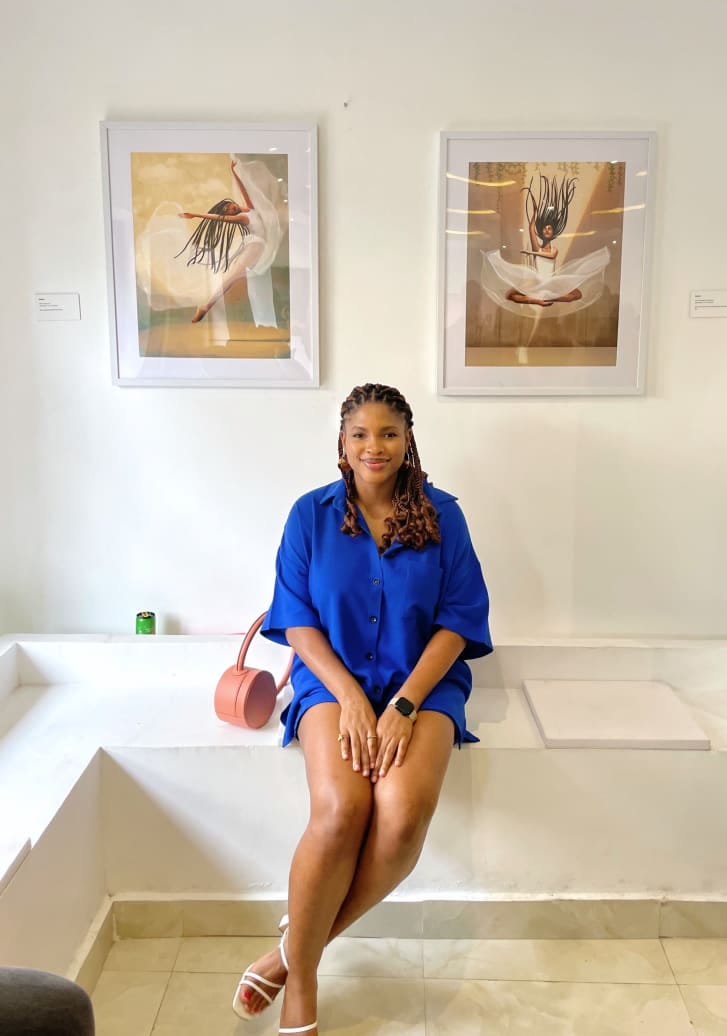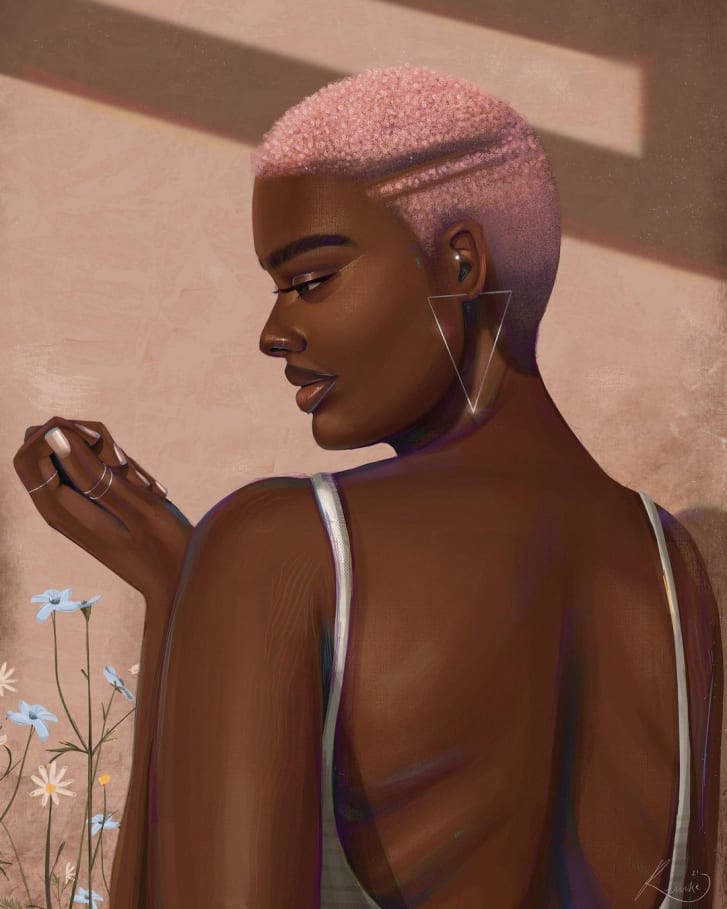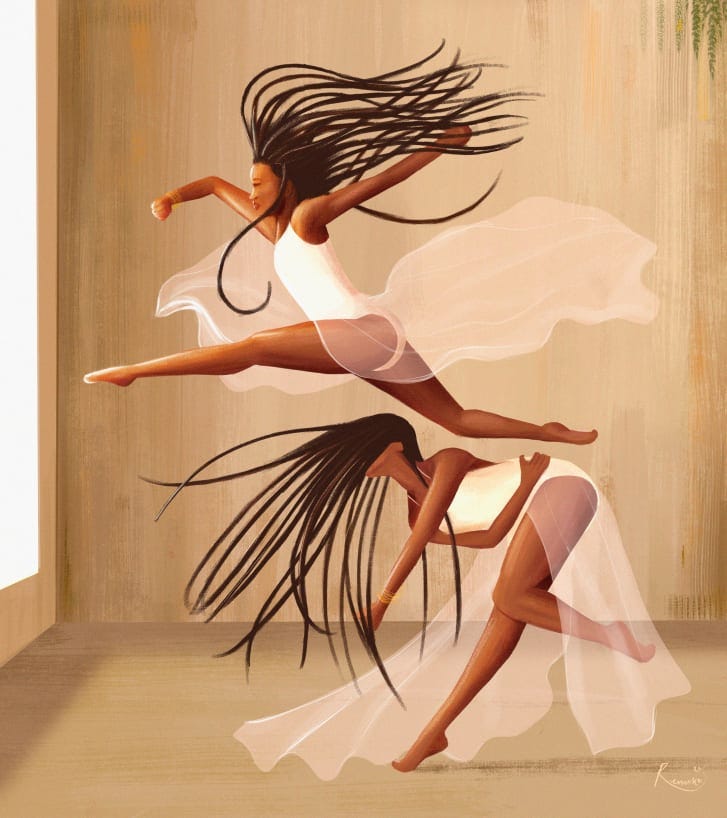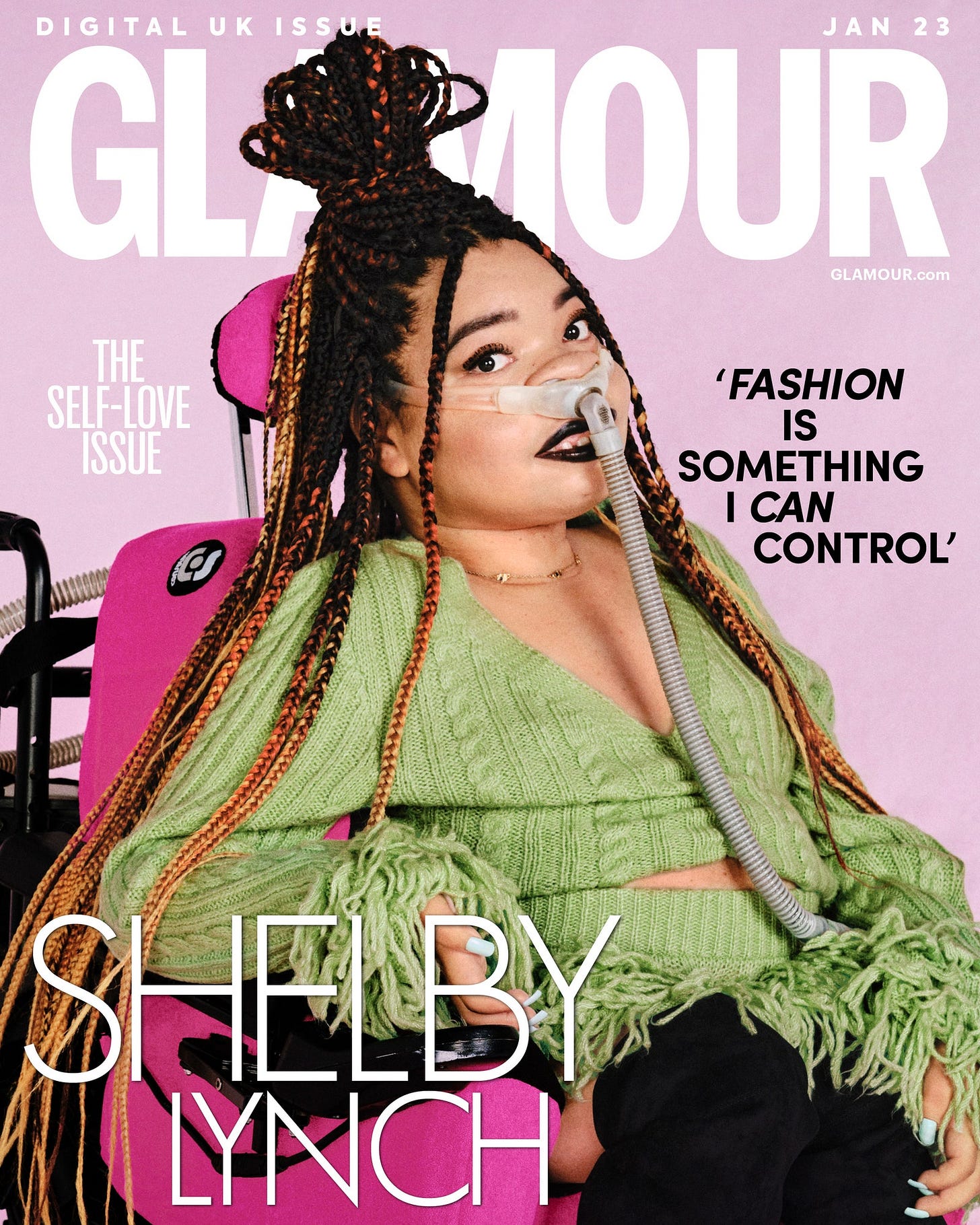Global Roundup: Indigenous Women on TikTok, Algeria Anti-Rainbow Campaign, Romania Couple vs Anti-LGBTQ Laws, Nigeria Artist Paints Black Women, Disabled Fashion & Beauty Influencer
Curated by FG Contributor Samiha Hossain
Via @resilientinuk
Indigenous women in Canada are creating videos on TikTok to bring attention to unsolved cases of missing and murdered members of their community, and to find new leads in cases that have not been properly investigated by the police. In the videos, they are asking people to come forward with tips on sightings of missing Indigenous women, fresh information about homicides and the location of buried bodies.
Indigenous women are 12 times more likely to be murdered or go missing than other women in Canada, and 16 times more likely to be killed or disappear than white women, according to a 2019 public inquiry into missing and murdered Indigenous women.
Vanessa Brousseau, whose sister Pamela Holopainen went missing almost 20 years ago from Schumacher, Ontario says she is posting on TikTok to raise awareness of her disappearance, partly because of lack of progress by Timmins police. She has posted a host of videos about her sister on her TikTok channel @resilientinuk, which has received 2.7 million likes.
I truly believe that somebody out there knows what happened to my missing sister Pamela. -Vanessa Brousseau
Raven Hall – whose aunt Tanya Holyk is believed to have been murdered by Vancouver serial killer Robert Pickton after her DNA was found at his pig farm – has highlighted multiple unsolved murders of Indigenous people on her @rave604 TikTok channel, as well as missing-persons cases dating back to the 1970s.
Hall, who is Tsimshian Xai’xais from Klemtu, British Columbia, said she was using her platform to amplify the voices of missing people’s families and “to highlight the injustice that is faced daily in systems not meant for Indigenous peoples.”
Melissa Swinamer has highlighted multiple missing-persons cases on her TikTok channel, Stolen Sisters and Relatives @JelloOcean2.0, including deaths not deemed suspicious by the police. Swinamer, who is part Indigenous, expressed concern that clusters of missing and dead Indigenous women in some areas are not being investigated together.
Deanne Hupfield from Thunder Bay, who also posts on TikTok, said many Indigenous people do not trust the police to properly probe deaths and disappearances.
[Police] jump to conclusions, they make assumptions, they don’t investigate. -Deanne Hupfield
These women are doing vital work in seeking justice for missing and murdered Indigenous women and girls. The Canadian government and law enforcement’s ongoing refusal to take these issues seriously is deeply troubling and one of many ways that the state continues to perpetuate violence towards Indigenous communities.
 Tiktok failed to load.
Tiktok failed to load.Enable 3rd party cookies or use another browser
The video shared on Twitter and Reddit depicts the police and other officials handing out information pamphlets to the public about LGBTQ+ flags and symbols. A large crowd can be seen gathered around two uniformed officers who are addressing the group about the multi-coloured images. The papers appear to contain information about the difference between a rainbow – which has seven colours – and a traditional rainbow Pride flag, which has six. As well as this, the handout showcases images of other flags and symbols related to LGBTQ+ identities, such as the transgender flag, asexual flag and Progress Pride flag.
The anti-rainbow campaign by Algerian authorities has seen officials ask consumers in the country to boycott items which carry rainbow colours or flags, as they are believed to be against the values of Algeria and Islam.
Homosexuality is currently illegal in the country, with people who are found guilty of same-sex acts facing up to three years in prison and a fine of up to 10,000 Algerian dinars. LGBTQ+ Algerians also face extreme prejudice and social stigma within their community and from family and friends. For instance, in 2020, an Algerian court sentenced more than 40 people to prison for attending a “gay wedding.”
Homophobic and transphobic campaigns such as these only fuel existing anti-LGBTQ sentiments and make violence and discrimination against the community more socially acceptable. It is especially important to highlight the voices of LGBTQ+ Algerians during these times.
Evie (right), a Romanian transgender woman, and her wife Gia © Daniel MIHAILESCU / AFP via France24
The country is one of the last in the EU where same sex marriages and civil partnerships are still outlawed, and last year its senate passed a law banning "gay propaganda" that might influence minors.
While Evie is a trans woman, her identity papers class her as male, meaning that technically, the two women could get legally married. But official "resistance" to their union began as soon as Evie turned up at their local town hall with her life coach partner to sort out the paperwork. They told her they would have to do some extra checks on her background. Then officials demanded that she come dressed according to the gender of her identity papers, which she refused to do. On their wedding day, officials first refused to marry them before relenting "after 20 minutes of debate.” They only managed to have photos taken after overcoming still more objections from the registrar. The experience has left the couple contemplating leaving the country.
There are a lot of problems in the country's laws that directly affect people like me…The older generation is still not accepting us. -Evie
The bill to prevent "the promotion of homosexuality and sex changes" is one of several such measures that hangs over Romania's LGBTQ community. It still needs approval from parliament's lower house, and no vote has yet been scheduled. Homosexuality was only decriminalised in Romania in 2001, and in recent years the country has increasingly tried to restrict LGBTQ rights, including trying to axe gender studies and to enshrine a ban on gay marriage in the constitution.
Showing people exist doesn't mean you are promoting their way of life. -Gia
For Evie and Gia the fight goes on. Evie has applied to a local court to have her gender changed on her identity document and expects a ruling soon. She is hopeful of a positive decision based on a European Court of Human Rights judgment that sided with several Romanian trans people on the issue.
Nigerian artist Morenike "Renike" Olusanya. Credit: Morenike Olusanya via CNN
Nigerian-born visual artist Morenike "Renike" Olusanya loves to paint Black women and wants others to be inspired by them. Olusanya, 28, studied creative arts at the University of Lagos and worked as a graphic designer before eventually taking up visual arts as a full-time job during the Covid-19 lockdown in 2020.
I'm in Nigeria; Black women are all I see. I love to paint our culture, our fashion and our hairstyles. -Morenike "Renike" Olusanya
Olusanya's art exists in many forms, such as portraits, dance art and book covers. Some of them are created on a canvas, but she prefers to illustrate digitally. By combining shapes, lines and shadows on her iPad, she has designed book covers for notable women including Aminata Touré, Germany's first Black female minister, award-winning American author Coe Booth, and Jamaican-American author Nicola Yoon.
Olusanya's "Aminta." Credit: Morenike Olusanya
One of Olusanya's pieces, "Aminata," is an image of a Black woman with short pink hair, wearing a sleeveless white dress that exposes her back.
The hair color was inspired by my friend, Chigozie. At the time, I found myself being insecure about all the fat on my back. So I painted that, as you'd notice in the portrait. It was my way of accepting myself. It was also a way of showing that it is natural for Black women like me to have fat on their bodies. -Morenike "Renike" Olusanya
Olusanya's "She will not be Silent." Credit: Morenike Olusanya
Another piece, "She will not be Silent" was created during the pandemic when there was a rise in cases of violence against women. Olusanya says the art was inspired by how women on social media lent their voices to support other women who had faced targeted harassment.
It was very heavy for me, but I wanted to create something powerful, something that shows that when a woman is being treated unfairly, there will always be other women trying to help out. -Morenike "Renike" Olusanya
In 2021, Olusanya was included in Leading Ladies Africa's list of 100 Most Inspiring Women in Nigeria and in 2022, she won the Lord's Achievers Special Recognition Award: A Lady Making Impact Through Art. She says the highlight of her career is getting commissioned to create portraits for some of the biggest brands in the world, including Hulu, Dark & Lovely, Penguin Random House, and Scholastic. In coming years, she hopes to keep creating and experimenting with art, collaborating with bigger brands, and hosting exhibitions in Lagos and other countries
Shelby Lynch is a 25-year-old fashion and beauty influencer with Spinal Muscular Atrophy Type 2. She uses her online platform to make fashion more accessible and to encourage the fashion industry to be more inclusive and representative of Disabled people.
Shelby talks about challenges growing up, including intrusive questions from classmates and being called the R-word. It was not until one of her very first shopping trips with her grandma that she was given the opportunity to make a choice for herself and express herself through fashion.
Clothes are not only fun for me, but they’re an area in my life over which I also have control. Building outfits and looks and putting different pieces together had absolutely nothing to do with my Disability or hospital appointments. I have always wanted to use my clothes and fashion to stand out. When you are Disabled, it’s like people only know you for your Disability. -Shelby Lynch
According to Shelby, so far the media attention she has received has been positive – she has been able to educate and engage people with not only her specific Disability but what it is like to be Disabled generally. However, she says that social media has been a “mixed bag.”
Getting validation from others made it easier for me to validate and adore myself. As I was getting more into the world of fashion and finding things that looked good on me, the more that list grew. My self-expression through the clothes I wear is just another way for me to show love to myself and to my body. -Shelby Lynch
Shelby believes that it gets better. Her life has changed significantly from her high school days – she has had the opportunity to do things that she never imagined possible but had always wanted: from modelling shoots and being interviewed to experiencing a romantic relationship.
While it is not always easy doing what I do, especially considering my Disability, I do know that it's important that younger Disabled people see someone like me, with my wheelchair and ventilator, being able to do fashion shows and being on the cover of magazines. -Shelby Lynch
For Shelby, her strong community is incredibly important and what she credits for enabling her to continue on her journey. For her, self-love stems from the love and appreciation she receives from others and that helps ground her.
Samiha Hossain (she/her) is a student at the University of Ottawa. She has experience working with survivors of sexual violence in her community, as well as conducting research on gender-based violence. A lot of her time is spent learning about and critically engaging with intersectional feminism, transformative justice and disability justice.
Samiha firmly believes in the power of connecting with people and listening to their stories to create solidarity and heal as a community. She refuses to let anyone thwart her imagination when it comes to envisioning a radically different future full of care webs, nurturance and collective liberation.



